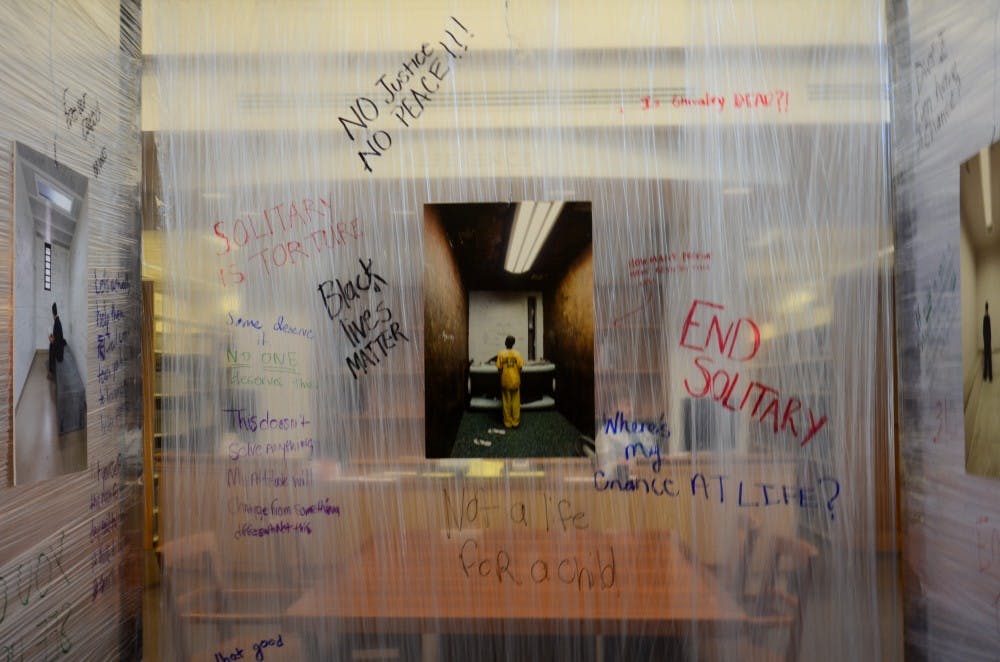“They’re just kids,” “No justice,” “No peace.”
These are just a few of the dozens of comments students have written on the translucent walls of a small, cell-like structure currently on display in the Biddle Law Library. The “cell” is meant to replicate the experience of solitary confinement, and guests are invited to participate in the exhibition by writing about their feelings while inside of it.
The exhibit features images from photographer Richard Ross’s “Juvenile In Justice” series, which depicts the living conditions of teens experiencing solitary confinement in the U.S. criminal justice system. Ross has been working with incarcerated youth for a decade and said the American public is woefully uninformed on the subject.
“They have no idea what goes on in there,” Ross said. “Putting kids in a cinderblock room with four corners, putting them in a uniform, doesn’t do anything.”
The cell will remain on display on the second floor of the library until Oct. 28.
In January, President Barack Obama announced a ban on solitary confinement of juveniles in the federal prison system. However, according to an August article in The Philadelphia Inquirer, juveniles can still be isolated in practice through punitive or administrative segregation, the situation many of Ross’s subjects find themselves in.
Ross not only photographs his subjects and their cells, but also documents their stories. To encourage them to open up to him, Ross follows a very careful approach. He always asks for permission from the cell’s occupant before entering. If granted, he takes off his shoes and sits on the floor, he said.
“The idea that I disarm them by entering their world and giving them power above me is something that is surprising to them,” Ross said. “So they do open up. Plus, they’re teenagers and they’re bored.”
One major collaborator in the creation and exhibition of the cell, was InLiquid, a nonprofit organization that promotes visual artists in Philadelphia. According to InLiquid Executive Director Rachel Zimmerman, Ross’s work is unmatched.
“It really doesn’t get any better, quite honestly,” Zimmerman said. “The prints and the pieces are so sad, but they’re incredibly beautiful. They’re not raw — they’re meticulous.”
Zimmerman feels that Ross’s work — combined with the cell-structure’s enclosed space — helps viewers to empathize with incarcerated youth.
“In [Ross’s photographs], you see that there is a human. It really connects you with this person and with their situation.”
That was the effect that third-year Penn Law student Martha Hanna hoped for when she reached out to Ross about displaying his work. As the co-director and co-founder of the student-run Youth Advocacy Project, Hanna has worked to direct attention to the problems facing youth in juvenile detention.
“Juvenile justice issues are devastating,” Hanna said, “and it’s hard to communicate them just through words. We have always felt like pictures and stories, rather than professors talking in front of a classroom, are important to spreading awareness to juvenile justice issues.”
Through YAP, Hanna also performs pro-bono legal services for incarcerated juveniles. One of her current clients, a 16 year-old being held at the adult jail — Philadelphia Industrial Correctional Center — has been placed in solitary confinement numerous times.
Ross said the whole practice of isolating juveniles is part of a “legal system gone awry.”
“Some of these kids are kept in isolation, for untenable periods of time,” he said, “and the only thing this does is destroy the kids. It doesn’t help them, it doesn’t make you or me safer, it destroys lives.”









